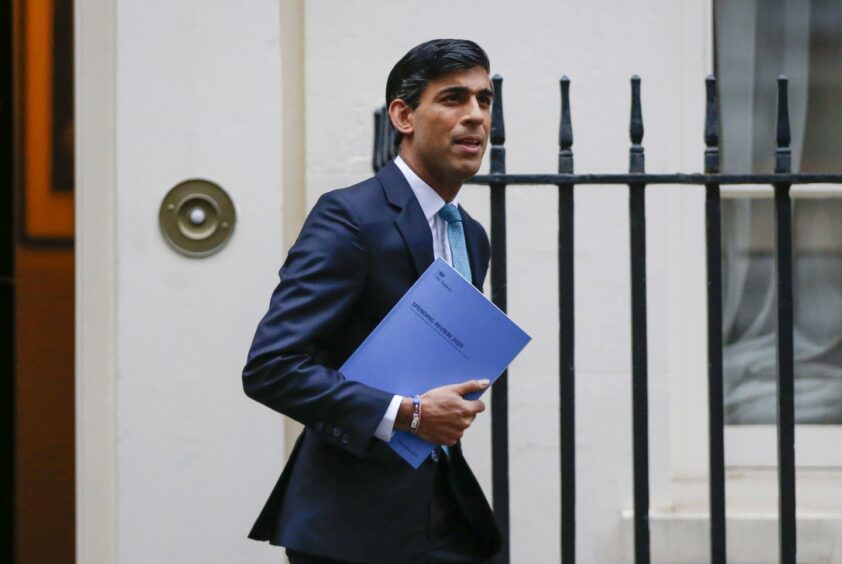
An oil and gas windfall tax is one of several options on the table for the Chancellor’s UK Spring Statement next week.
As Russia’s invasion of Ukraine piles upward pressure on oil and gas prices, there are calls for Rishi Sunak to alleviate a mounting cost-of-living crisis before taxes and domestic energy bills rise next month.
With petrol and diesel already at a record, economists are warning that food and energy could push inflation into double digits later this year. Sunak is due to update the House of Commons on his policy plans on March 23.
Originally billed by the Treasury as an assessment of the state of the economy rather than a major policy event, there’s mounting pressure on the chancellor from MPs of all stripes, as well as business and consumer groups, to soften the blow for ordinary Britons and companies.
A Treasury spokesman said that Sunak is looking at whether policy changes are required and declined to comment on whether any specific measures are under consideration.
Here are some tools Sunak is being urged to deploy:
Cut Fuel Duty
Successive Conservative governments have frozen fuel duty for 12 years. But at 57.95 pence per liter, it makes up more than a third of the current price charged at the pumps. He’s now under pressure to cut it, with Tory lawmakers Jake Berry and Robert Halfon among those bringing it up in the Commons in recent days.
Neighboring France is already providing a 15 euro-cent-rebate per liter and Germany is considering a proposal for compensation on motor-fuel bills.
Scrap the Payroll Tax Hike
Opposition parties want Sunak to scrap a 12 billion-pound ($16 billion) tax hike to fund health and social care that’s due to start in April. Many backbench Tories don’t like the rise in National Insurance either, though only five voted against it when it was announced.
But Sunak and Prime Minister Boris Johnson have stood firm on the levy, penning a joint article in the Sunday Times less than two months ago defending the plan.
Raise Tax Thresholds
If Sunak won’t scrap the national insurance rise he should raise the threshold at which Britons start paying it in order to protect those on lower incomes, according to the Centre for Policy Studies, a think tank.
Raising the employee national insurance threshold to 11,284 pounds rather than 9,880 pounds as planned would mean those on below-average incomes would face no change in their national insurance bill, the CPS said.
Sunak could also look at income-tax thresholds, which he froze a year ago until April 2026. That’s turned into a 20.5 billion-pound stealth tax, according to the Institute for Fiscal Studies.
Increase Welfare Spending
The Resolution Foundation is urging Sunak to increase benefits payments by 8% in April, rather than the 3% planned, a policy that would cost about 9 billion pounds.
Such an increase is “by far the most effective way to support those on lower incomes,” according to the think tank.
Another option would be for Sunak to further cut the so-called taper rate at which the poorest workers lose Universal Credit benefits as their income from work increases. He already announced a reduction to 55% from 63% in October.
Windfall Tax on Oil & Gas Companies in Spring Statement
The opposition Labour Party has called on Sunak to levy a windfall tax on the profits of oil and gas companies, which are benefiting from high energy prices and use the proceeds to help struggling families.
But the government has consistently rejected the measure, arguing it would reduce investment in the sector at a time when the government wants to encourage domestic energy production.
Cut VAT on Energy Bills
Labour, energy suppliers, and at least 20 Tory MPs have argued the government should scrap VAT on energy bills, currently levied at 5%, which typically costs households about 60 pounds a year. But Johnson has previously ruled that out, calling it a “blunt instrument” that would also benefit wealthier consumers who don’t need the tax break.
Extend Energy Support to Firms
While Sunak announced a 9 billion-pound package in February to help domestic consumers with energy bills, he’s under pressure to extend that help to businesses who are also struggling with the rising cost of power and heating. They, in turn, have to pass added costs onto consumers, adding to the pressure on living costs.
The Federation of Small Businesses, says Sunak should replicate the help he’s given consumers for micro-businesses. “They act the same as consumers and they pay the same as consumers,” according to Craig Beaumont, the FSB’s head of external affairs. He cited cases of small companies facing annual energy bills rising to 10,000 pounds from 2,000 pounds.
The British Chambers of Commerce said ministers should create a fund to support companies hit by higher bills, extend the coronavirus recovery loan scheme by six months, and place a moratorium on all policy measures that increase business costs.
Taking these actions would give firms “headroom to keep a lid on prices, protect jobs and make investment,” said BCC Director General Shevaun Haviland.
Recommended for you
